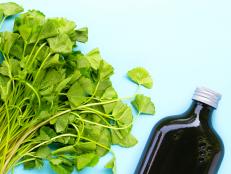Here are the Best Immune-Boosting Foods
Give your immune system an edge by nourishing your body.

Foods That’ll Treat Your Body Well
It’s always important to make sure you’re setting your body up for success with a healthy and nutritional foundation. We spoke with Riley Rearden and Danielle Schaub, the culinary and nutrition managers for Territory Foods, as well as Maya Feller, a registered dietician nutritionist, to compile this list of the best foods to work into your diet to give your immune system an added boost.
Berries
Sure, you may have a general idea about why berries are good for you, but Rearden suggests focusing on blueberries, raspberries and elderberries as much as possible when considering your immune system.
"Berries are called superfoods for a reason," Rearden said. "They may be tiny, but they are packed with antioxidants, which are beneficial for immunity, warding off toxins and cell damage and decreasing inflammation."
Brazil Nuts
Seek out these little guys in trail mixes or packaged alone.
"Brazil nuts have very high amounts of selenium," Rearden said. "Studies have shown that increased amounts of selenium in our bloodstream are associated with an enhanced immune response. They also support thyroid function and the healthy fats are great for brain function."
Hemp Seeds
If you are a vegetarian or vegan, nuts and seeds can be incredibly important. That said, they also contain zinc, which helps the body fight off viruses.
"Hemp seeds in particular can contain up to 43 percent of your daily zinc recommendation," Rearden said. "Seeds also are a great source of fiber, healthy fats, vitamins and minerals, which all contribute to a healthy immune system."
Garlic
To me, garlic is one of those secret ingredients that really should be in everything. It can boost the flavors of meats, cooked or steamed veggies and just about any side dish out there. Luckily, it’s great for you.
"One clove of garlic contains a powerhouse of calcium, potassium and more than 100 sulfuric compounds, which all help to ward off bacteria and infection," Rearden said. "Raw garlic is most beneficial for health, so if the odor is too strong, there are supplement versions as well."
Ginger
Ginger is great for cooking but if you don’t like the flavor, it may be worth trying to squeeze in anyway. You can even use a stick of it to stir coffee to remove the bitter taste.
"Ginger is a potent antioxidant, and also contains magnesium, iron, zinc and calcium," Rearden said. "Studies have suggested that ginger has antimicrobial properties that could help kill viruses."
Oregano
Schaub explains that oregano is thought of as a super herb because it "contains thymol and carvacrol, [which are] known to fight infections, as well as tons of antioxidants."
If you’re super opposed to the taste (because it is super strong), Schaub recommends trying oregano oil. It’s strong as well but can be worked into recipes.
Red Bell Peppers
Making fajitas? Include red bell peppers. You could also chop them up and freeze them, then pop the peppers into a stir fry.
Fun fact: Did you know that red bell peppers are rich in vitamin C? "Oranges may be the poster child for vitamin C, but a cup of chopped red bell peppers will provide you with three times more vitamin C than an orange," Rearden said. "Not to mention it’s a great source of Vitamin A, which is great for your vision."
Shiitake Mushrooms
The great thing about mushrooms is that they cook down, so they’re easy to add into dishes, and they’re definitely worth the added effort. Rearden cited a study by the American College of Nutrition, which found that mushrooms can actually "improve the efficiency of the immune system, improve gut immunity and decrease inflammation."
Cinnamon
Planning on baking? Sprinkle some fresh ground cinnamon on top of your favorite cookies. "Studies suggest that cinnamon may protect us against viral infection,"Schaub said.
Another perk? It also contains cinnamaldehyde and eugenol, which are phytochemicals known to be antibacterial.
Apples, Pears and Bananas
Finally, Feller came through with recommendations for fruits. She generally encourages people to focus on foods that are minimally processed. Fruits also tend to have a higher water content and, in general, Feller emphasized that "hydration is incredibly important as every system in the body is dependent on water for optimal functioning." So, drink up!
YOU MIGHT ALSO LIKE: Here’s When To Buy — And When To Skip — Organic Foods, Looking for a Late-Night Snack? Here’s What To Pick, Which is Better: Snacking Before or After a Workout?





















